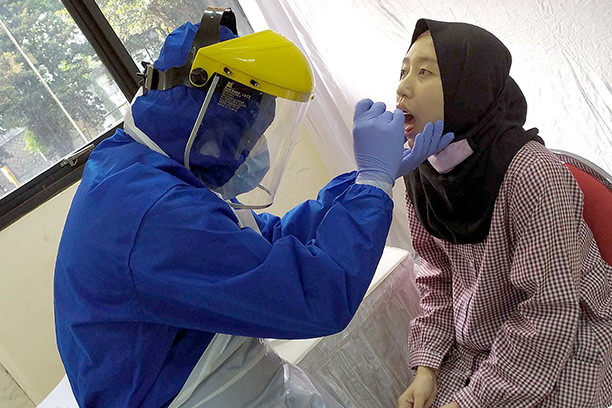Popular Reads
Top Results
Can't find what you're looking for?
View all search resultsPopular Reads
Top Results
Can't find what you're looking for?
View all search resultsTanoto Foundation, Temasek Foundation International donate PCR equipment to GSI Lab
GSI Lab is a social enterprise that uses its profit to improve the health quality of Indonesians. Through this program, GSI Lab was said to receive various equipment, including PCR instruments, reagent kits and single-use products for PCR testing.
Change text size
Gift Premium Articles
to Anyone
T
anoto Foundation and Singapore-based Temasek Foundation International donated various pieces of equipment for conducting polymerase chain reaction (PCR) tests to Genomik Solidaritas Indonesia (GSI) Lab, a high throughput laboratory in South Jakarta, on Monday.
GSI Lab is a social enterprise that uses its profit to improve the health quality of Indonesians.
Through this program, GSI Lab was said to receive various pieces of equipment, including PCR instruments, reagent kits and single-use products for PCR testing.
Global Tanoto Foundation CEO Satrijo Tanudjojo said during a virtual event on Monday that collaboration was key in this challenging time.
He further said that the foundation had collaborated with the National Disaster Mitigation Agency (BNPB), the Research and Technology Ministry as well as local administrations to contain the spread of COVID-19.
However, they realized the importance of improving the testing rate at a national level, which led them to donate PCR equipment to GSI Lab.
“Currently, GSI Lab has a capacity of 5,000 tests daily. With the donation from Tanoto Foundation and Temasek Foundation International, we can add 600 more tests daily,” he explained.
Meanwhile, Temasek Foundation International chief executive Benedict Cheong said in a statement that the organization had been trying to support various efforts to contain the COVID-19 pandemic in several neighboring countries.
“In this tough time, we need to have high solidarity and collaborate to help restore public health,” he said.
Read also: Indonesia’s COVID-19 testing positivity remains far above WHO standard for ‘new normal’
GSI Lab chairman Nino Susanto expressed his gratefulness for the donation.
He told The Jakarta Post that in addition to the 3M health protocols -- menggunakan masker (mask wearing), mencuci tangan (handwashing) and menjaga jarak (social distancing) -- it was also important to increase public awareness about the 3T: testing, treatment or isolation and tracing.
“Testing is important to break the chain of transmission,” he said.
Nino also encouraged corporations and individuals to protect one another by undergoing independent PCR tests to accurately know their health condition.
It has been almost eight months since President Joko “Jokowi” Widodo announced the first COVID-19 cases in March, but Indonesia’s low testing rate has persisted as laboratories throughout the archipelago face problems ranging from limited testing kits to delays in reported results.
According to Oct. 16 data compiled by Oxford University’s Our World in Data, Indonesia had tested 0.12 people per 1,000 daily on a seven-day average. The figure was lower than the Philippines’ 0.3 per 1,000 and India’s 0.79 per 1,000.
The latest World Health Organization situation report on Indonesia highlighted the need for the country to increase its lab capacity to ensure all suspected cases were tested. WHO data showed a widening gap between suspected cases and the number of people tested. (jes)
Editor’s note: This article is part of a public campaign by the COVID-19 task force to raise people’s awareness about the pandemic.










